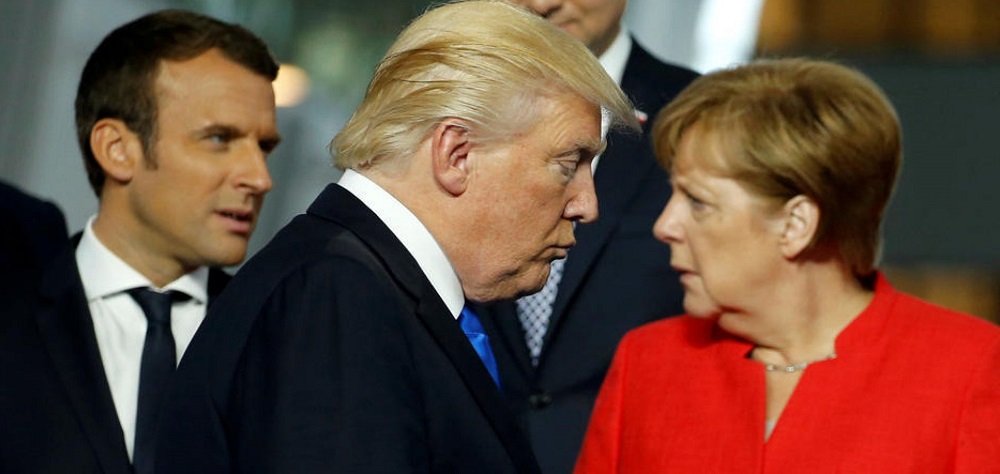Alwaght- Since Trump assumed US presidency in 2017, the gaps of both sides of the Atlantic have never been this deep and wide.
Recently, the US said that it is gradually removing its forces from Germany. The plan for the phased withdrawal of American troops from the European country has been designed by the American President Donald Trump for some time. On Tuesday night, Trump confirmed that the US troops in “delinquent” Germany will be cut to 25,000.
Trump’s excuse for cutting the number of American troops serving in Germany is his dispute with the Europeans over the NATO budget and military spending.
At a meeting on Monday, the American president commented on the planned removal of forces, saying that the Europeans had violations in their payments to the North Atlantic Treaty Organization.
“Germany as you know is … delinquent on their payments to NATO,” Trump told a small group of reporters at the White House. “They owe NATO billions and they know it… Why should we be doing what we’re doing if they don’t pay?”
But a fact should not be disregarded and it is that the Trump US is at odds with Europe not just over NATO budget but a long list of other issues.
Difference-hit US-Europe relations
These days, the US and Europe are at loggerheads over a wide range of issues. While the Trump administration is supportive of the Israeli plan to annex West Bank to the occupied territories, the EU, referring to the UN resolution of 1967, strongly is opposed to the move and even threatened to sanction Tel Aviv.
In general, Trump differs from the EU over some of the Israeli measures. It is not just West Bank annexation that creates gaps between the two. The annexation of the Israeli-occupied Syrian Golan Heights by Tel Aviv is also an issue of division of both sides of the Atlantic.
While the Israeli authorities praise the Trump’s aggressive policy and his support to Tel Aviv in Golan Heights annexation case and on Sunday approved a plan to build a new town named after Trump in the occupied heights, the EU still recognizes the Golan Heights occupied territory and refused an Israeli demand for recognition.
Europe and the US are different in many international treaties and agreements, including Paris climate agreement and the Iran nuclear deal which was signed in 2015 between Iran and the world powers— the US, China, Russia, Germany, France, and Britain. While the EU backs the agreements, Washington pulled out of them.
The range of bilateral differences even reaches China. While Britain entered contracts with Chinese communication giant Huawei to develop its fifth-generation network, or 5G, the US government severely opposed the deals, calling on London and other European capitals to refrain from giving the company a place in their next-generation communication networks. EU showed signs it is not listening to the American demands.
Thus, the NATO and the European share in the military bloc’s budget is one among many other issues proving divisive in the US-EU relations.
NATO share an American excuse
The US government insists that European failure to pay adequate money as its share to NATO is provoking its withdrawal of troops from Germany. But it seems that the spending is just a simple excuse behind the plan for force withdrawal.
Generally, Trump's foreign policy is a mix of isolationism and simultaneous interventionism. On the one side, Trump administration wants to bring back the American troops home and on the other hand is not able to halt intervention across the world as the president is surrounded by strategists interested in interventionist foreign policy. This foreign policy paradox makes him try to impose costs on the allies while seeking to cut American military spending.
Europe’s tough path against the US
On the other side, the European countries are concerned with Trump's behavior. These concerns motivate the movement of these countries towards reducing dependence on the US. For example, as Trump threatened the EU with sanctions over NATO spending, President Immanuel Macron of France in a statement talked about the need for the European state to unite and be independent of the US.
Earlier, he called for the formation of a “European force.” Even when the US formed the so-called Persian Gulf maritime coalition and started patrolling in the Strait of Hormuz, the EU forces, led by France, patrolled independently. These developments suggest nothing but the European pro-independence efforts. Separation of the two sides of the Atlantic in security and military coalitions means undermining NATO.
Actually, the US-EU differences will show themselves mostly in the form of weakness of NATO as a leading Western military organization and will make it increasingly inefficient. After all, the government in the US is not interested to spend more on NATO budget and the EU powers like France and Germany lean to forming a domestic army independent of the US dictates and sway.
Still, there is no united voice against Washington in the EU. The European powers, like France and Germany, want more freedom of action for the EU from the US. But such countries as Hungary, Poland, and even Italy with their right-wing governments are more consistent with Trump than with Merkel and Macron.
Thus, Europe has a tough path in its push to gain independence of policy and action from Washington due to its internal differences. With some European countries ruled by right-wing governments, perhaps European policy independence from the US will remain an unrealized slogan.



























